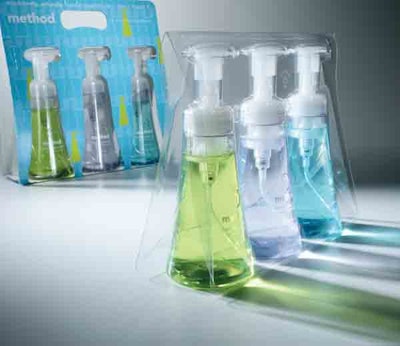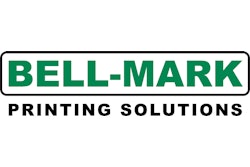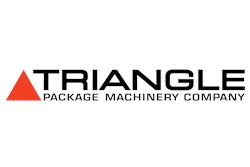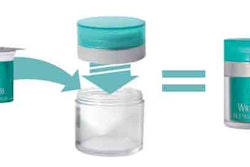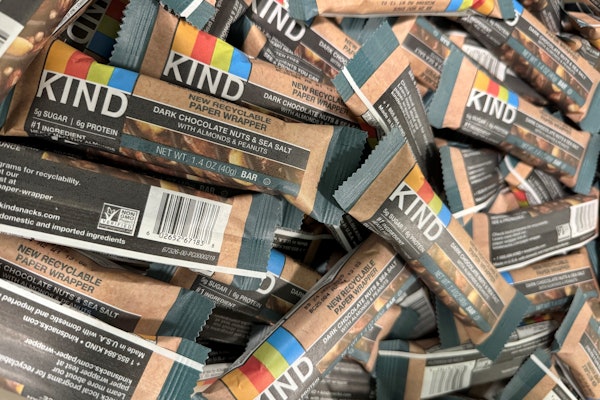When San Francisco-based Method Home Products develops a new product, the company gives careful consideration to the environmental impact of the selected packaging. In fact, the people at Method are so ardent about sustainable packaging that they have worked with custom-thermoformed protective packaging specialist Universal Protective Packaging, Inc. (UPPI) (www.uppi.com) to create sustainable packaging using SmartCycle™ 150 PET films.
These films come to the marketplace by way of Michael Brown, founder and managing partner of Packaging 2.0 LLC (www.packaging2.com), which holds the SmartCycle trademark. The films are processed with renewable energy and guaranteed to contain a minimum content of 50% post-consumer recycled polyester bottles. Klöckner Pentaplast (www.kpfilms.com) is the exclusive global supplier of SmartCycle film and sheet in partnership with Packaging 2.0 LLC.
Founded in 2001, Method makes all kinds of cleaning products, using only biodegradable ingredients. Jokes Method’s packaging director Ted Wang, “You could drink our spray cleaner and not die, but I wouldn’t recommend it. We strike a balance between efficacy and the environment, while providing a healthy alternative to the ‘big boys.’ We’ve identified a need for a younger, hipper product with a look that appeals to people such as new moms.”
Indeed, to achieve that hipper look, the company employs the talents of award-winning industrial designer Karim Rashid, who has more than 70 objects included in permanent museum collections around the world. From its products to the package design, Method works to convey a “clean” image.
“So it made sense to use SmartCycle when we got this new gig from Costco to package our three varieties of foaming hand-wash soap in a pack,” says Wang. The three varieties are Eucalyptus Mint, Green Tea, and Sweet Water. They are contained in 10-oz slender bell-shaped bottles with plunger dispensers. The average retail price is less than $2 per bottle.
For three years, Costco had been stocking Method’s original three-pack hand-wash gel. But the foaming hand wash is a more recent product release, and both Costco and Method wanted to change the look of the original. The new outer package for the foaming hand-wash three-packs looks like a clamshell with the film substrate hugging the bottles.
But a side view reveals it’s a stand-up triangle. Tim Ritter at thermoformer UPPI puts it this way: “The packaging is a tented blister, like a teepee. The bottom is open. The plastic clamshell surrounds the three bottles with a hinge that folds over at a 330-degree angle. The blister snaps over the bottles at the top and acts as a convenient carrying handle. This way, the packaging is minimized, presenting a clean image with little waste.”
Explains Ted Wang, “We want to be part of the solution. The blister is not sealed, but rather wrapped in recycled paperboard that is glued.” The paperboard is printed and wraps around the package. It has die-cut holes so the consumer can see the attractive colors of the foaming hand wash.
There are a couple of advantages to this. For one, the paperboard allows more graphics on the outside. A second advantage is that the packaging stands up so the product can be four or five deep in the display carton without the chance of tipping over. This improves shelf display appearance.
Team effort
“We’ve worked with UPPI for more than a year, and the company is outstanding,” reports Wang. “We heard of them through the grapevine because of their shared commitment to the environment. The company has great designers. After presenting a few packaging concepts for the foam hand-wash three-pack, they hit it right off the bat.”
UPPI’s Ritter says, “This is the first project we’ve done with SmartCycle films in this type of application. SmartCycle processed remarkably well. It responds and processes identically to other PET and polyester films.”
PET is the plastic most commonly used in drinking water and soft drink bottles. Because most municipalities collect PET bottles, SmartCycle products offer a wonderful opportunity to increase public awareness about the benefits of plastic recycling.
Klöckner Pentaplast has been marketing SmartCycle film since October 2006. A key goal for the film marketing program is to help people feel smart about their packaging choice by conveying the story of recycling and sustainable packaging through the entire packaging value chain—consumers, retailers, OEMs, converters, and resource recovery plants.
As the public becomes more aware of the results of its recycling efforts, it can drive an increase in the recycling of plastic bottles, and the availability of PET feedstock will increase. The program begins by marking all packages with the unique SmartCycle logo, which is derived from the petaloid-shaped base found on most PET bottles. Seeing that identifying mark can help make consumers feel good about their purchase choice.
Ritter says, “Klöckner Pentaplast offers an excellent, consistent film at a fair price. You can count on delivery from them. As far as I am concerned, Klöckner Pentaplast is constantly moving the bar upward for the rest of the rigid films industry.”
Method Home Products ranks #7 as one of the fastest-growing private companies in the country, according to Inc. Magazine’s 2006 Inc. 500 list. “If you want to find out which companies are going to change the world, look at the Inc. 500,” says Inc. editor Jane Berentson.
Packaging development timeline
The whole project took six months to develop, and was pretty intense, says Ritter. The whole process started with about a half dozen different concepts created using CAD software. From there, UPPI developed one prototype, which needed one final change and a few tweaks. UPPI created the tooling prototype, and then produced it for the Sencorp (www.sencorp-inc.com) 2500 in-line thermoformer used to make the blister.
Says Ritter, “Using SmartCycle 150 PET, we didn’t have to treat the tooling at all differently. The film is easily interchangeable with PET and PETG. No changes were necessary.”
In total, UPPI was responsible for designing the package, including both the plastic and paperboard components, thermoforming the SmartCycle PET, and shipping the packaging to Method’s assembler in Chicago. Finally, Method’s three-pack foaming hand-wash made it on to the “pallet” at Costco in late December 2006. UPPI expects to ship 500,000 units annually to the Chicago assembler.
“We are going to use SmartCycle products for all our new packaging from here on,” says Wang. “The EPA recently inducted Method into its Green Power Leadership Club, which recognizes organizations that have made exemplary green purchases. The SmartCycle program is totally in line with everything we are about. It’s another way we can live up to our mission ‘to rid the world of dirty.’”
With its products stocked at numerous club stores, such as BJ’s, and at the big chains such as Target (which carries the largest breadth), Method is in the forefront of raising consumer consciousness about sustainable packaging.
